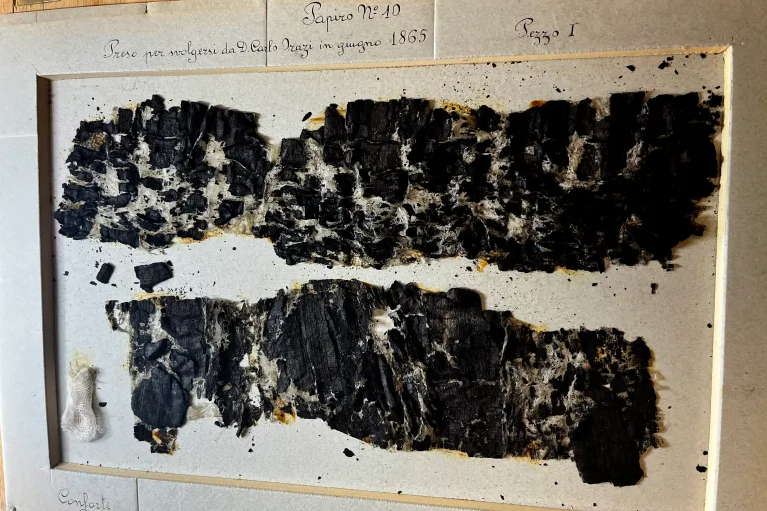
Three researchers, one of them Egyptian, won a prize of $700,000 on Monday for their success in using artificial intelligence to decode a small portion of manuscripts dating back nearly 2000 years that suffered extensive damage due to the eruption of Mount Vesuvius in 79 AD, according to the French news agency.
The competition, named the “Vesuvius Challenge,” was initiated by the computer science researcher at the University of Kentucky, Brent Seales, along with Nat Friedman, the founder of the “GitHub” platform, now owned by Microsoft.
The organizers of the competition explained that the “Herculaneum” manuscripts consist of about 800 scrolls that were charred during this eruption, which buried the Italian cities of Pompeii and Herculaneum about two thousand years ago.
These scrolls, resembling charred tree trunks, are preserved at the Institute of France in Paris and the National Library in Naples, and they easily disintegrate and deteriorate when attempting to open them.
The organizers conducted a scan of four manuscripts before the competition and offered a total reward of one million dollars to whoever could decipher at least 85% of the codes in 4 segments consisting of 140 characters.
The winning trio of the “Vesuvius Challenge” includes Egyptian doctoral student in Berlin, Youssef Nader, intern at “SpaceX” company Luke Farritor from Nebraska in the United States, and Swiss robotics student Julian Schilliger.
The three used artificial intelligence to analyze the ink on papyrus paper, identifying the nature of Greek characters by observing repetitions. Using this technique, Luke Farritor succeeded in deciphering the first word in the segment, which is the word “purple” in Greek.
Thanks to their collaboration, they were able to decipher about 5% of one of the manuscripts, according to the organizers. Nat Friedman explained that its author is “probably the ancient philosopher Philodemus” who wrote “about food, music, and how to enjoy the pleasures of life.”
Some historians believe that these documents were previously owned by Lucius Calpurnius Piso Caesoninus, the father-in-law of Julius Caesar. The “Villa of the Papyri,” where the manuscripts were found in the 18th century, is still mostly buried, believed to contain thousands of other manuscripts.
Robert Fowler, a researcher and president of the “Herculaneum Society,” told Bloomberg Businessweek that “some of these texts could completely rethink the history of the major stages in the ancient world.”
Deciphering these texts would indeed be a major achievement, as an inventory conducted by the University of California at Irvine showed that only 3 to 5% of ancient Greek texts have survived to the modern era.
Leave a Reply